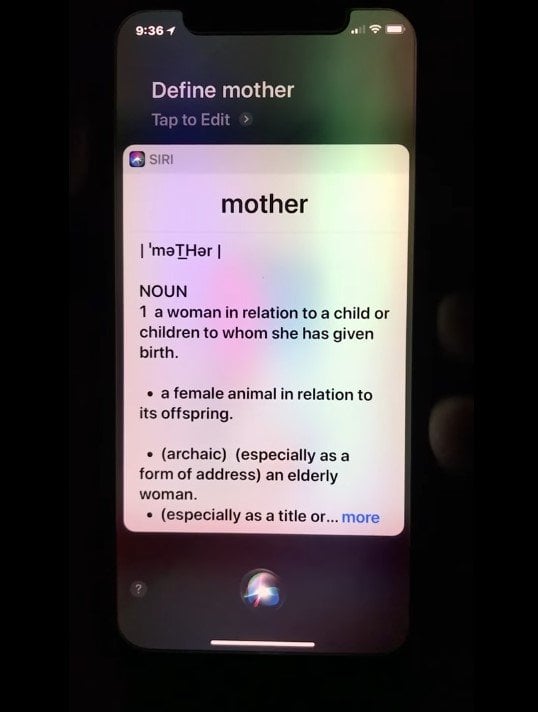Siri has been a valuable utility to many iPhone users for quite a few years now, serving as one of the first virtual assistants packed tidily into a mobile device. When you ask Siri to define the word mother, however, you may get an unexpectedly vulgar response.
While Siri is certainly an advanced utility that can anticipate your whims and find information on pretty much anything, any sort of artificial intelligence is built with some flaws – even for the most advanced sort of technology. With how many questions Siri deals with on a daily basis, there are bound to be some issues that slip through the cracks – but few have been found so far that have the same vulgar (and frankly, hilarious) results as asking the AI to define the word Mother.
When you summon Siri on your phone and ask it to define the word mother, you’ll find that the first definition is simple enough – giving users a straightforward definition like we’d all expect. The problem, however, comes from the second result when you ask Siri to give more information – in which she states that “it means, short for ‘motherf*cker.’”
Strangely enough, this unexpected response to asking Siri to define the word mother occurs across nearly all iOS devices – confirmed to be present on devices from the iPhone 5S all the way up to the iPhone X and iPads. The problem is also present on macOS as well – giving vulgar results to requests across all sorts of platforms.
The problem with asking Siri to define the word mother stems from the fact that it is pulling the definition from the Oxford Dictionary – a trusted source, but also one that offers the “motherf*cker” definition as the secondary meaning for the word “mother.” When you expand the response that Siri gives when you ask her to define the word mother, you’ll see the swear written on the screen in plain language.
What is strange about the way in which Siri handles this request is that it completely bypasses some far-more-commonly used secondary definitions for mother and skips right to the fourth definition which is pretty vulgar. While many Apple fans delight in trying to get Siri to swear, it’s certainly a problem for users who are looking for an innocuous definition – especially as we get closer and closer to Mother’s day. Unfortunately, the voice activation of Siri hasn’t caught on in the same way that Apple has hoped, with many users finding limited usage for Siri in their day to day lives – perhaps making these funny occurrences such as asking the utility to define the word mother one of the few ways in which people interact with the software.
While Siri seems to be more than content to provide you with a vulgar answer when asking her to define the word mother, she gets very judgy when you swear at her yourself – even going so far as to scold you for your language and request you to be more kind. This is a pretty smart and reasonable response by Apple to address people swearing at their personal assistants, but it doesn’t seem to have been extended far enough into the utilities own definitions – causing people to end up with situations like this vulgar response when asked to define the word mother.
According to Gizmodo, Sheryl Brahnam, a faculty member in Missouri State University’s Computer Information System Department, somewhere between 10 to 50 percent of human interactions with AI are abusive. This is a wide range of statistics, but even at the low end, that’s a pretty high number considering the numerous requests that Siri deals with in any one day. Perhaps with how much we swear at Siri we shouldn’t be too incensed when she responds in kind – but it’s definitely an unintended effect that Apple was hoping to avoid by policing their assistant as much as possible.
As mentioned above, it’s clear that with any advanced AI there are going to be some issues that can’t be ironed out even with the most careful monitoring – and in the purest sense, Siri was doing her job when she gave the vulgar response when asked to define the word mother. While there are some issues in the fact that she chose the fourth secondary definition as the option to provide when prompted to give more information, this seems to be a problem on Oxford’s Dictionary rather than Siri herself.
While she was one of the first smart assistants to hit the market, Siri is probably the least advanced out of the major options at this point in time – falling far short of the capabilities of utilities like Google Assistant. It remains to be seen whether these small issues will be ironed out or left in for the immature among us to continue to exploit.
[SOURCE]




